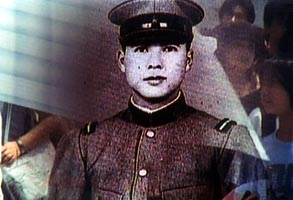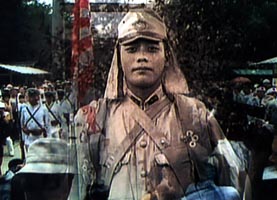|
Riben
Guizi
|
Minoru
Matsui
|
| Japanische Soldaten des Teufels |
Japan
2001
|
 |
 |
| Delphi-Filmpalast 12.02
15.45 CinemaxX 3 13.02 10.00 CineStar 8 13.02 18.30 Kino Arsenal 14.02 12.15 |
| Produktion: Directors System
Co. Ltd. Weltvertrieb: Directors System Co. Ltd. 203, 4-19-8 Jingumae, Shibuya-Ku, Tokio 150-0001, Japan Tel. (81-3) 37 46 0395, Fax 37 46 03 97 E-mail: direct704@aol.com Kamera, Ton, Produzent: Ken’ichi Oguri Musik: Ryosuke Sato Schnitt: Minoru Matsui Format: 16mm, Farbe Länge: 160 Minuten, 24 Bilder/Sek. Sprache: Japanisch |
| Das japanische Militär verstand sich
als eine dem ‘göttlichen’ Tenno verpflichtete Armee
und war folgerichtig von der Einzigartigkeit und Überlegenheit
der japanischen Rasse überzeugt. Von diesem Selbstverständnis
beseelt, beging es zuerst in China (1931–1945) und dann im gesamten
südostasiatischen Raum unbeschreibliche Greueltaten. Japanische
Soldaten waren dort als ‘Soldaten des Teufels’ gefürchtet.
“Kriegsopfer sprechen oft über ihre Erlebnisse, während die Täter schweigen. Aber gerade aus den Worten der Täter können wir wichtige Erkenntnisse über menschliche Verhaltensmuster in Kriegssituationen gewinnen. Es ist wichtig, jetzt zu erfahren, wie normale Menschen, wie unsere eigenen Großväter und Väter selbst zu Tätern, zu Kriegsverbrechern wurden und was sie wirklich taten.” Minoru Matsui Dieser Film dokumentiert die Eingeständnisse von insgesamt vierzehn ehemaligen Soldaten der kaiserlichen Armee. Ihrer Herkunft, Ausbildung und ihrem Beruf nach sind sie ganz unterschiedlich, und ihre militärischen Ränge reichen vom einfachen Soldaten bis zum Offizier und vom Militärarzt bis zum Militärpolizisten. Riben Guizi ist das erschreckende Dokument über eines der düstersten und deshalb oft verdrängten Kapitel japanischer Geschichte. |
The Japanese military considered itself
bound to the ‘divine’ Emperor and was thus convinced of
the uniqueness and supremacy of the Japanese race. Inspired by this
conviction, it committed indescribable atrocities first in China and
then throughout Southeast Asia. Across the region, Japanese soldiers
were feared as ‘soldiers of the devil’. “The victims of war often talk about their experiences, while the perpetrators remain silent. But is from the words of the perpetrators in particulat that we can gain important insight into human behavioural patterns in times of war. It is important at the present time to discover how normal people like our own grandfathers and fathers themselves became perpetrators and war criminals, and what they really did.” Minoru Matsui This film contains the admissions of a total of fourteen former soldiers of the imperial army. They are very different in terms of their background, education and profession. Their military ranks range from that of simple soldier to officer, from military doctor to military policeman. Today, half a century after the Second World War, the Japanese society has undoubtedly changed. However, it has yet to confront its own past, let alone investigate the war crimes it committed. Already two-thirds of the population belong to the post-war generation. The memories of the war will soon disappear from Japanese minds, and that before the issue of Japanese guilt has ever been properly settled. |
| Minoru Matsui, geb. 1947. Journalismus-Studium. Seit 1985 Regisseur von Spiel- und Dokumentarfilmen, u.a. Cross-roads in Tokyo (1991), Nightmare (1992), Dream of a High School Student (1995), A Million Japanese War Refugees from the Occupied Territories (1997). |